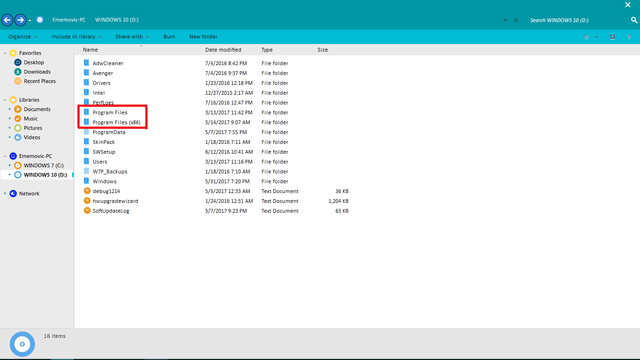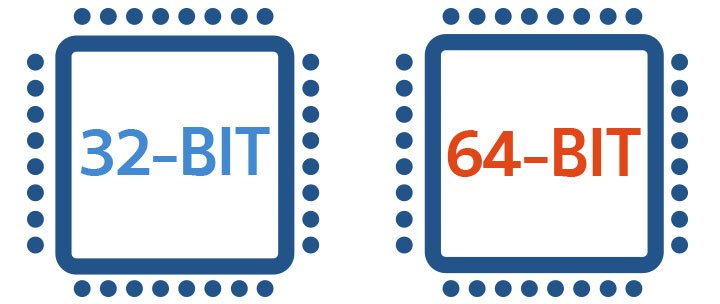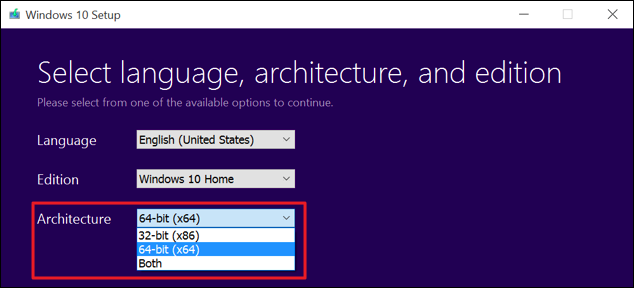The Differences Between 32-bit and 64-bit Architecture (Part 2)
Hello guys,
This is a continuation from where I stopped yesterday, in case you missed it, you can gladly check it out here and be carried along. The topic still remains 32-bit vs 64-bit architecture.
“A brief Recap”
64-bit architecture, whether CPU, operating systems or programs is better than its predecessor because it’s faster, not limited to 4 gigabyte of RAM and it processes and take more information from the RAM than its predecessor. Most of the programs you see this days are specifically designed for 64-bit architecture instead of 32-bit because of its limitations.
If you do happen to be installing Windows any time soon and you have the choice between 32-bit (X86) and 64-bit, you definitely want to go for the 64-bit.
There used to be issues with manufacturers not having drivers and sometimes a lot of programs wouldn't work but now, all manufacturers are making 64-bit drivers so you don't have to worry about that and you're not gonna have any issues.
One thing you should keep in mind is when you upgrade windows not necessarily a clean install, typically, windows will keep the same version through that upgrade so if you have a 32-bit version of Windows and you do an upgrade, it's going to give you a 32-bit version of the next edition of Windows.
If you've been upgrading Windows since Windows XP or others where you have 32-bit, you might want to check because you might still have a 32-bit version of windows since you never did a clean install. And if that’s the case, then you will have to do a clean install which it's kind of a pain in the neck cos you have to do a reformat typically, that's annoying but you will get some benefit if you have more than four gigabytes of RAM. If you don't, then it's not really necessary but you still might want to.
Are there any disadvantages to running 64-bit architecture?
 [3]
[3]You might be wondering whether there’re any disadvantages to running 64-bit windows or programs, well the answer is based on compatibility because if you're running 32-bit windows then you might be using a really old device that doesn't have 64-bit drivers and in that case, if you need to keep that device maybe it’s necessary for your livelihood then it wouldn't make sense to upgrade obviously because you wouldn't be able to use it.
Another disadvantage is if you have 64-bit operating system, then you might not be able to run 16-bit programs on windows 64-bit, It can only run 32-bit and 64-bit program. A 32-bit operating system can only run 16-bit and 32-bit program. I don't even know any examples of 16-bit programs that anyone would need, maybe if you're using an ancient software, that could be a reason to stick to 32-bit but I don't think that's going to be for many people.
I’ve expounded on 64-bit processor, 64-bit operating system and of course you probably know that there are 32-bit and 64-bit programs that run on these operating systems and some of you might be thinking if 64-bit is so great, then why are there so many 32-bit programs still around?
If you didn't notice when you go into Windows on a 64-bit version, there will be two folders for Program Files:
“Program Files” and “Program Files (x86)”

The screen shot above shows that “Program Files” doesn’t have any extension, that’s the folder where 64-bit programs are stored, while “Program Files (x86)” is the folder where 32-bit programs are stored and located. In case you didn’t know, ”32-bit” is the same as “x86”.
Obviously, this does mean that you can run a 32-bit program on windows 64-bit without any issues, Microsoft was sure to make sure that there would be no issues because pretty much all programs were written in 32-bit and it would not be nice if everyone's program just didn't work anymore.
Realistically, running a 32-bit program versus a 64-bit program, you're probably not going to notice any difference. The difference would be that a 32-bit program can only use up to 4 gigabytes of RAM whereas the 64-bit could use as much as you need.
The reason why there are still so many 32-bit programs is that a lot of developers assume that their program is very small, it definitely doesn't need 4 gigabytes of RAM so they may just write it in 32-bit and then it'll work on everyone's computers, 32-bit or 64-bit rather than writing two separate programs that no one's gonna know the difference which they have to compile it separately and there might be changes they have to make in the code. It’s not worth the hassle since there's not going to be any difference so they just write it in 32-bit.
In general, if you do have the choice, it’s probably better to install the 64-bit version of the program, it might run a little bit more efficient especially if it does need more than 4 gigabytes of RAM then you definitely want to run it and take advantage of it. Also, you do get a little bit more of those security features that I explained on the first post, it'll integrate better with that patch protection and it'll just run better in general .
Conclusion
I guess there's not much more to explain about it, the conclusion is what I just did and if you have the choice, go with 64-bit unless you have a Super old device that won't work otherwise.
If you guys have any ideas of your own, something I forgot to explain about, you can let me know by replying this post. If you enjoyed it, Pls don’t forget to give an Upvote.
References: 1 - 2 - 3
Image sources: 1 - 2 - 3


GIF made by @foundation
Thanks to @camzy & @samstickkz for this amazing toon.




Cool... Valid knowledge. Nice one bro
Thank you.
Very timely information I would say.
Educating piece, nice one bro
Thanks for dropping by.